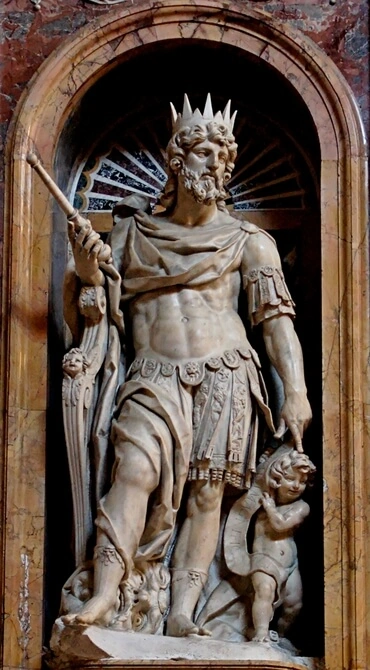1
ובעז עלה השער וישב שם והנה הגאל עבר אשר דבר־בעז ויאמר סורה שבה־פה פלני אלמני ויסר וישב׃
2
ויקח עשרה אנשים מזקני העיר ויאמר שבו־פה וישבו׃
3
ויאמר לגאל חלקת השדה אשר לאחינו לאלימלך מכרה נעמי השבה משדה מואב׃
4
ואני אמרתי אגלה אזנך לאמר קנה נגד הישבימ* ונגד זקני עמי אם־תגאל גאל ואם־לא יגאל הגידה לי [כ= ואדע] [ק= ואדעה] כי אין זולתך לגאול ואנכי אחריך ויאמר אנכי אגאל׃
5
ויאמר בעז ביום־קנותך השדה מיד נעמי ומאת רות המואביה אשת־המת [כ= קניתי] [ק= קניתה] להקים שם־המת על־נחלתו׃
6
ויאמר הגאל לא אוכל [כ= לגאול] [ק= לגאל]־לי פן־אשחית את־נחלתי גאל־לך אתה את־גאלתי כי לא־אוכל לגאל׃
7
וזאת לפנים בישראל על־הגאולה ועל־התמורה לקים כל־דבר שלף איש נעלו ונתן לרעהו וזאת התעודה בישראל׃
8
ויאמר הגאל לבעז קנה־לך וישלף נעלו׃
9
ויאמר בעז לזקנים וכל־העם עדים אתם היום כי קניתי את־כל־אשר לאלימלך ואת כל־אשר לכליון ומחלון מיד נעמי׃
10
וגם את־רות המאביה אשת מחלון קניתי לי לאשה להקים שם־המת על־נחלתו ולא־יכרת שם־המת מעם אחיו ומשער מקומו עדים אתם היום׃
11
ויאמרו כל־העם אשר־בשער והזקנים עדים יתן יהוה את־האשה הבאה אל־ביתך כרחל וכלאה אשר בנו שתיהם את־בית ישראל ועשה־חיל באפרתה וקרא־שם בבית לחם׃
12
ויהי ביתך כבית פרץ אשר־ילדה תמר ליהודה מן־הזרע אשר יתן יהוה לך מן־הנערה הזאת׃
13
ויקח בעז את־רות ותהי־לו לאשה ויבא אליה ויתן יהוה לה הריון ותלד בן׃
14
ותאמרנה הנשים אל־נעמי ברוך יהוה אשר לא השבית לך גאל היום ויקרא שמו בישראל׃
15
והיה לך למשיב נפש ולכלכל את־שיבתך כי כלתך אשר־אהבתך ילדתו אשר־היא טובה לך משבעה בנים׃
16
ותקח נעמי את־הילד ותשתהו בחיקה ותהי־לו לאמנת׃
17
ותקראנה לו השכנות שם לאמר ילד־בן לנעמי ותקראנה שמו עובד הוא אבי־ישי אבי דוד׃ ף
18
ואלה תולדות פרץ פרץ הוליד את־חצרון׃
19
וחצרון הוליד את־רם ורם הוליד את־עמינדב׃
20
ועמינדב הוליד את־נחשון ונחשון הוליד את־שלמה׃







